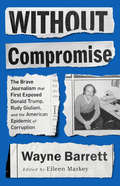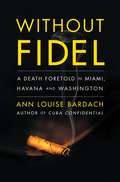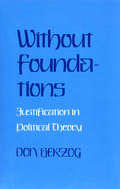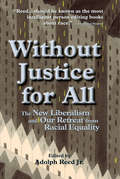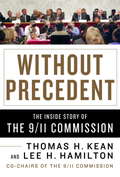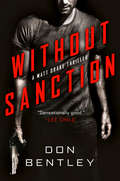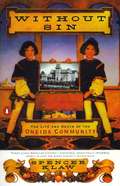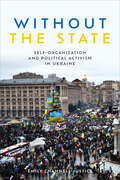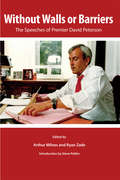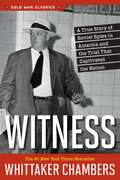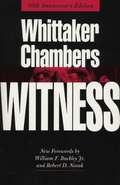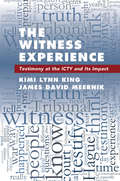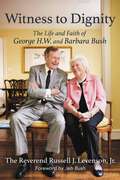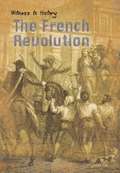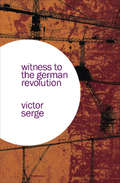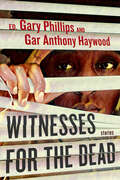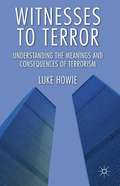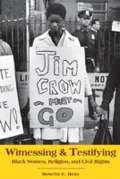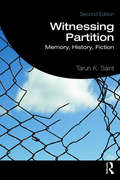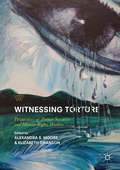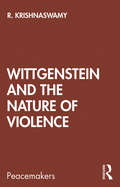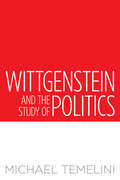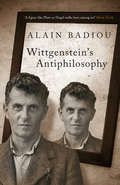- Table View
- List View
Without Compromise: The Brave Journalism that First Exposed Donald Trump, Rudy Giuliani, and the American Epidemic of Corruption
by Wayne BarrettA collection of groundbreaking investigations by Wayne Barrett, the intrepid, muckraking Village Voice journalist who exposed corruption in New York City and beyond.With piercing moral clarity and exacting rigor, Wayne Barrett tracked political corruption in the pages of the Village Voice fact by fact, document by document for 40 years. The first to report on the scams and crooked deals that fueled the rise of Donald Trump in 1979, Barrett went on to expose the shady dealings of small-time slum lords and powerful New York City politicians alike, from Ed Koch to Rudy Giuliani to Michael Bloomberg.Without Compromise is the first anthology of Barrett's investigative work, accompanied by essays from colleagues and those he trained. In an age of lies, fog, and propaganda, when the profession of journalism is degraded by the White House and the industry is under financial threat, Barrett reminds us that facts, when clearly accumulated, are our best defense of democracy.Featuring essays by:Joe ConasonKim Phillips-FeinErrol LouisGerson BorreroTom RobbinsTracie McMillanPeter NoelAdam FifieldJarrett MurphyAndrea BernsteinJennifer GonnermanMac Barrett
Without Fidel: A Death Foretold in Miami, Havana and Washington
by Ann Louise BardachFrom the award-winning reporter and go-to source on Cuban-Miami politics Ann Louise Bardach comes a riveting, eye-opening account of the last chapter in the life of Fidel Castro: his near death and marathon finale, his enemies and their fifty-year failed battle to eliminate him, and the carefully planned succession and early reign of his brother Raúl. <p><p>Ann Louise Bardach offers a spellbinding chronicle of the Havana-Washington political showdown, drawing on nearly two decades of reporting and countless interviews with everyone from the Comandante himself, his co-ruler and brother Raúl, and other family members, to ordinary Cubans as well as officials and politicos in Miami, Havana, and Washington. The result is an unforgettable dual portrait of Fidel and Raúl Castro -- arguably the most successful and enduring political brother team in history. <p><p>Since 1959, Fidel Castro has been the supreme leader of Cuba, deftly checkmating his foes, both from within and abroad; confronting eleven American presidents; and outfoxing dozens of assassination attempts, vanquished only by collapsing health. <p><p>As night descends on Castro's extraordinary fifty-year reign, Miami, Havana, and Washington are abuzz with anxious questions: What led to the lightning-bolt purge of key Cuban officials in March 2009? Who will be Raúl's heir? Will the U.S. embargo end now? <p><p>Bardach offers profound and surprising answers to these questions as she meticulously chronicles Castro's protracted farewell and assesses his transformative impact on the world stage and the complex legacy that will long outlive him. She reports from three distinct vantage points: In Miami, where more than one million Cubans have fled, she interviews scores of exiles including Castro's would-be assassins Orlando Bosch and Luis Posada Carriles; in Washington, DC, she reports on the Obama administration's struggle to formulate a post-Castro strategy; in Havanah she permeates the bubble around the fiercely private and officially retired Castro to ascertain the extent of his undisclosed medical condition. <p><p>Bardach delivers a compelling meditation on one of the most controversial, combative, and charismatic rulers in history. Without Fidel includes never-before-published reporting on Castro, his family, and his half-century grip on the largest country in the Caribbean while assessing how his departure will forever transform politics and policy in the Western Hemisphere -- and the world.
Without Foundations: Justification in Political Theory
by Donald J. HerzogCan political theorists justify their ideas? Do sound political theories need foundations? What constitutes a well-justified argument in political discourse? Don Herzog attempts to answer these questions by investigating the ways in which major theorists in the Anglo-American political tradition have justified their views. Making use of a wide range of primary texts, Herzog examines the work of such important theorists as Thomas Hobbes, John Locke, the utilitarians (Jeremy Bentham, J. S. Mill. Henry Sidgwick, J. C. Harsanyi, R. M. Hare, and R. B. Brandt), David Hume, and Adam Smith. Herzog argues that Hobbes, Locke, and the utilitarians fail to justify their theories because they try to ground the volatile world of politics in immutable aspects of human nature, language, theology, or rationality. Herzog concludes that the works of Adam Smith and David Hume offer illuminating examples of successful justifications. Basing their political conclusions on social contexts, not on abstract principles, Hume and Smith develop creative solutions to given problems.
Without Justice For All: The New Liberalism And Our Retreat From Racial Equality (Stories Without Words Ser.)
by Adolph ReedWithout Justice for All: The New Liberalism and Our Retreat from Racial Equality questions, examines, and explains the way a new orthodoxy of American leaders has contributed to the social stratification and inequality which plagues America today. By looking at the history of our social policies since the New Deal, as well as the status of specific policy arenas, essayists show how political shifts over the past fifty years have moved us away from a more egalitarian politics. Throughout, the book responds critically to the now conventional argument that liberalism must be reconfigured in ways that retreat from immediate identification with the interests of labor, minorities, and the poor. From a look at federal housing policy and the failure of New Deal social programs to an examination of long established public assistance programs and Affirmative Action, Without Justice for All is a timely and important contribution to the dialogue on race in modern America.
Without Precedent
by Thomas H. Kean Lee H. Hamilton Benjamin RhodesIn the words of the commission’s co-chairmen, this is the compelling inside story of how the National Commission on Terrorist Attacks Upon the United States—more commonly known as the 9/11 Commission—managed to succeed against all odds in producing a report that made clear what went wrong and why. The mandate of the 9/11 Commission was daunting and all-encompassing. In its investigation of the events leading up to and including September 11, 2001, the commission had to examine U. S. diplomacy, military policy, intelligence agencies, law enforcement, border and aviation security, and congressional oversight, as well as the immediate response to the terrorist attacks, while also investigating the lethal enemy al Qaeda. The creation of the 9/11 Commission was blocked for months by the Bush administration, and after its inception in December 2002 the commission spent months mired in a series of controversies—the resignation of its first chairman, Henry Kissinger, and vice-chairman, George Mitchell; an inadequate budget; an extraordinarily polarized atmosphere leading up to the 2004 presidential election; the conflicting demands of various interest groups; the distrust of the victims’ families; difficulties in obtaining access to highly classified documents and to al Qaeda detainees; and a media eager to record stumbles and gaffes. The obstacles were great, and the expectations for a blue-ribbon panel are never high—yet somehow the 9/11 Commission overcame everything that might have thwarted it and succeeded beyond anyone’s greatest expectation, holding a series of hearings that riveted the nation, producing a unanimous and widely heralded report that became a national best seller, and issuing recommendations that led to the most significant reform of America’s national security agencies in decades. The 9/11 Commission report slaked the national thirst for accountability. Here for the first time is the story of how the commission came together to produce its landmark document.
Without Sanction (A Matt Drake Thriller #1)
by Don BentleyAfter surviving a clandestine operation that went tragically wrong, Matt Drake escaped Syria with his life, but little else. Now, to save the life of another, he must return to Syria and confront his biggest failure in a debut thriller Lee Child calls "sensationally good." Defense Intelligence Agency operative Matt Drake broke a promise. A promise that cost three people their lives and crippled his best friend. Three months later, he's paralyzed by survivor's guilt and haunted by the memories of the fallen. Matt may have left Syria, but Syria hasn't left him.In the midst of his self-imposed exile, Matt is dragged back into the world of espionage and assets that he tried to forget. A Pakistani scientist working for an ISIS splinter cell has created a terrifying weapon of mass destruction. The scientist offers to defect with the weapon, but he trusts just one man to bring him out of Syria alive—Matt Drake.
Without Sin: The Life and Death of the Oneida Community
by Spencer KlawWithout Sin chronicles the rise and fall of nineteenth-century America's most succesful experiment in Utopian living: New York's Oneida Community (1848-1880). This remarkable society flourished for more than thirty years as a unique world where property was shared, men and women were equals, sex was free and open, work was to be joyous, and pleasure was felt to be "the very business that God set Adam and Eve about".
Without the State: Self-Organization and Political Activism in Ukraine (Anthropological Horizons)
by Emily Channell-JusticeWithout the State explores the 2013–14 Euromaidan protests – a wave of demonstrations and civil unrest in Ukraine – through in-depth ethnographic research with leftist, feminist, and student activists in Kyiv. The book discusses the concept of "self-organization" and the notion that if something needs to be done and a person has the competence to do it, then they should simply do it. Emily Channell-Justice reveals how self-organization in Ukraine came out of leftist practices but actors from across the spectrum of political views also adopted self-organization over the course of Euromaidan, including far-right groups. The widespread adoption of self-organization encouraged Ukrainians to rethink their expectations of the relationship between citizens and their state. The book explains how self-organized practices have changed people’s views on what they think they can contribute to their own communities, and in the wake of Russia’s renewed invasion of Ukraine in 2022, it has also motivated new networks of mutual aid within Ukraine and beyond. Based on ethnographic fieldwork, including the author’s first-hand experience of the entirety of the Euromaidan protests, Without the State provides a unique analytical account of this crucial moment in Ukraine’s post-Soviet history.
Without Walls or Barriers: The Speeches of Premier David Peterson (Library of Political Leadership Series)
by Arthur Milnes Ryan ZadeIn June 1985, David Peterson was sworn in as the leader of Ontario’s first Liberal government in forty-two years. This collection of speeches explores the activist agenda the London, Ontario, lawyer pursued through his premiership and Peterson’s agenda, which sought to ensure all Ontarians were able to participate fully in provincial society. When Peterson was asked what he viewed as his most important accomplishment, he thought for a brief moment and then whispered with obvious emotion, “breaking down walls and barriers.” Through his speeches, readers can see Premier Peterson on the wider Canadian stage by addressing the economic challenges faced by the federation – most notably free trade – and by supporting the Meech Lake Accord, which was designed to bring Quebec into the constitutional family. His speeches also show him on the global stage, engaged in the challenges of the transformation of world politics and Canada’s trading relationship with the United States. By the time Peterson’s premiership had come to an end in 1990, the Berlin Wall had fallen, Europe was increasingly integrated, a fragmented Soviet Union was beginning to collapse, the Canada-United States Free Trade Agreement was in full force and effect, and the age of globalization had begun. Through this selection of speeches, the editors also present insights into a range of other figures, from former premiers and Peterson’s political contemporaries to the British royal family. Particularly powerful tributes include Nelson Mandela’s first visit to Canada and Peterson’s eulogy for MPP Dalton McGuinty, Sr., the father of Ontario’s 24th premier. TVOntario’s Steve Paikin provides an in-depth introduction that puts the life and political times of Premier Peterson and his government between in broader perspective.
Witness (Cold War Classics)
by Whittaker Chambers#1 New York Times bestseller for 13 consecutive weeks!First published in 1952, Witness is the true story of Soviet spies in America and the trial that captivated a nation. <P><P>Part literary effort, part philosophical treatise, this intriguing autobiography recounts the famous case and reveals much more. Chambers' worldview and his belief that "man without mysticism is a monster" went on to help make political conservatism a national force. <P><P>Regnery History's Cold War Classics edition is the most comprehensive version of Witness ever published, featuring forewords collected from all previous editions, including discussions from luminaries William F. Buckley Jr., Robert D. Novak, Milton Hindus, and Alfred S. Regnery.
Witness (50th Anniversary Edition)
by Whittaker ChambersWhittaker Chambers has written one of the really significant American autobiographies... penetrating and terrible insights into America in the early twentieth century. -- Arthur Schlesinger Jr.
The Witness Experience: Testimony at the ICTY and Its Impact
by King Kimi Lynn Meernik James DavidThis book provides the most comprehensive and scientific assessment to date of what it means to appear before war crimes tribunals. This ground-breaking analysis, conducted with the cooperation of the International Criminal Tribunal for the former Yugoslavia (ICTY) Victims and Witnesses Section, examines the positive and negative impact that testifying has on those who bear witness to the horrors of war by shedding new light on the process. While most witnesses have positive feelings and believe they contributed to international justice, there is a small but critical segment of witnesses whose security, health, and well-being are adversely affected after testifying. The witness experience is examined holistically, including witness' perceptions of their physical and psychological well-being. Because identity (gender and ethnicity) and war trauma were central to the ICTY's mandate and the conflicts in the former Yugoslavia, the research explores in-depth how they have impacted the most critical stakeholders of any transitional justice mechanism: the witnesses.
Witness to Dignity: The Life and Faith of George H.W. and Barbara Bush
by Russell Levenson, Jr.This is the untold, intimate, and eye-witness account of the character, integrity, service, faith, and dignity of former President George H.W. Bush and first lady Barbara Bush by their priest, pastor, and friend. George and Barbara Bush belonged to and were active members of a Houston church for more than 50 years. The rector of that church, Reverend Russell Jones Levenson, Jr., believes he was invited into private moments with these public individuals so he could serve as a witness: a witness to observe, and a witness to tell. With never-before shared correspondence, experiences, and personal stories, Levenson offers new insight into the Bushes&’ wit and wisdom; their commitment to family and friends; their tireless desire to bless the lives of others; and their steadfast loyalty to their church, their faith, and their God. Before embarking on writing this book on faith, Levenson sought and received the blessing of all the Bush children, including the 43rd president. Readers will laugh, cry, and be inspired as Levenson ponders how and why he was put in this unique pastoral position, asking questions like, &“What on earth was I doing reading the sports section of the paper with the forty-first president, his cabinet member Brent Scowcroft, and a Chinese official on a breezy morning at Walker&’s Point in Kennebunkport, Maine?&” Levenson writes with emotion about being with President Bush and Barbara Bush as they each took their last breaths on this earth. He then describes in full detail the surreal experience of planning a state funeral and giving a eulogy with other presidents in the front row. This is book is for readers who yearn for our public officials to serve with faith and integrity like the Bushes. But above all else, this book shows how powerful it is when world leaders are humbled before the power that rests above all powers. &“Reverend Levenson was a dear friend and spiritual mentor to both my beloved grandparents. His stories of friendship will fill you with hope and inspire grace.&”―Jenna Bush Hager, Co-Host, NBC News&’ Today with Hoda & Jenna
Witness to History: The French Revolution
by Sean ConnollyWhat was it like to be a member of the nobility during the French Revolution? What was it like to watch an execution by guillotine? What was it like to be a witness to history? Step back in time to the French Revolution and see history through the eyes of those who lived it. Find out what it was like to be a radical at the heart of the revolution. Discover how it felt to be the mayor of Paris as the streets were filled with rioting crowds. Hear the account of Louis XVI's priest as the king was led to his place of execution-and the feared guillotine.
Witness to the German Revolution
by Victor Serge"Serge searingly evokes the epochal hopes and shattering setbacks of a generation of leftists."-BookforumFollowing in the wake of the carnage reaped across Europe by world war, German workers undertook a struggle that would prove decisive in determining the course of the entire twentieth century. In 1923 the fledgling Comintern dispatched Victor Serge, with his peerless journalistic skills, to Berlin to expedite the German Revolution and write these moving reports from the battlefront.Victor Serge is best known as a novelist and for his Memoirs of a Revolutionary. Originally a participant in the anarchist movement, Serge became a committed bolshevik upon arrival in Russia in 1919 and lent his considerable talents to the cause of spreading the revolution across Europe. An eloquent critic of tyranny no matter its form, Serge was a leading member of the Left Opposition in its struggle against Stalin, a cause which ultimately resulted in his exile from Russia.
Witness to War: An American Doctor in El Salvador
by Charles ClementsAfter serving as a pilot in the Vietnam War, Charles Clements found himself a Quaker doctor in the middle of a war zone in El Salvador. This book details how foreign governments can use the threat of Communism to manage the annihilation of a country and its people. This stirring first-hand account displays the worst and the best within people as it witnesses how El Salvadorans lived, loved and fought to protect their families and way of life, much as would any people in any country.
Witnesses for the Dead: Stories
by Gary Phillips and Gar Anthony HaywoodHow does witnessing a crime change a person? This powerful collection of stories by a star-studded roster of contributors examines this very question, with proceeds benefitting the Alliance for Safe Traffic Stops. Inspired by recent true events, the all-original stories in Witnesses for the Dead are set in motion by the act of witnessing. The characters who populate these pages are not themselves the perpetrators of the crimes they see, but as they grapple with what to do—take action or retreat into the shadows—their lives are indelibly changed. In &“Envy&” by Christopher Chambers, a sweet, shy wallflower looks on as something horrific happens in his neighborhood—revealing something horrific about himself. Agatha Award–winner Richie Narvaez&’s &“The Gardener of Roses&” sees a Puertorriqueña college student on the run from the FBI for her accidental involvement in a &“terrorist&” plot. Anthony Award–winner Gary Phillips confronts police corruption in &“Spiders and Fly.&” And the protagonist of &“A Family Matter&” by IPPY Award–winner Sarah M. Chen investigates the murder of a stranger, leading her to question the political structure of Taiwan entirely. Other stories feature a brothel, the film industry, immigrant detention centers at the Mexico-US border, World War II–torn France, and the COVID-19 pandemic. The stories are incisive, unflinching, wry, dark, and, in some cases, terrifying. You&’ll ask yourself: If I saw what they saw, what would I do? Edited by Anthony Award–winner Gary Phillips and Shamus Award–winner Gar Anthony Haywood, the collection includes contributions from NAACP Image Award–winner Pamela Samuels Young, New York Times bestsellers Cara Black and Tod Goldberg, Edgar Award–winner SJ Rozan, Agatha Award–winner Richie Narvaez, and more.
Witnesses to Freedom: Young People Who Fought for Civil Rights
by Belinda RochelleDescribes the experiences of young Blacks who were involved in significant events in the civil rights movement, including Brown vs. Board of Education, the Montgomery bus boycott, and the sit-in movement.
Witnesses to Terror
by Luke HowieThis book argues that it is witnesses who are the targets of terrorism and that the question of whose witnessing counts, and which stories are the most legitimate, is of vital importance for understanding the meanings and consequences of contemporary terrorism.
Witnessing and Testifying: Black Women, Religion, and Civil Rights
by Rosetta E. RossThe need to focus on physical and emotional survival for well over 250 years was a most powerful component of circumstances out of which Black religion evolved.
Witnessing Partition: Memory, History, Fiction
by Tarun K. SaintThis book interrogates representations — fiction, literary motifs and narratives— of the Partition of India. Delving into the writings of Khushwant Singh, Balachandra Rajan, Attia Hosain, Abdullah Hussein, Rahi Masoom Raza and Anita Desai, among many others, it highlights the modes of ‘fictive’ testimony that sought to articulate the inarticulate — the experiences of trauma and violence, of loss and longing, and of diaspora and displacement. The author discusses representational techniques and formal innovations in writing across three generations of twentieth century writers in India and Pakistan, invoking theoretical debates on history, memory, witnessing and trauma. With a new Afterword, the second edition of this volume draws attention to recent developments in Partition studies and sheds new light as regards ongoing debates about an event that still casts a shadow on contemporary South Asian society and culture. A key text, this is essential reading for scholars, researchers and students of literary criticism, South Asian studies, cultural studies, modern history and the general reader.
Witnessing Torture: Perspectives of Torture Survivors and Human Rights Workers (Palgrave Studies in Life Writing)
by Elizabeth Swanson Alexandra S. MooreThis book demonstrates a new, interdisciplinary approach to life writing about torture that situates torture firmly within its socio-political context, as opposed to extending the long line of representations written in the idiom of the proverbial dark chamber. By dismantling the rhetorical divide that typically separates survivors’ suffering from human rights workers’ expertise, contributors engage with the personal, professional, and institutional dimensions of torture and redress. Essays in this volume consider torture from diverse locations – the Philippines, Argentina, Sudan, and Guantánamo, among others. From across the globe, contributors witness both individual pain and institutional complicity; the challenges of building communities of healing across linguistic and national divides; and the role of the law, art, writing, and teaching in representing and responding to torture.
Wittgenstein and the Nature of Violence (Peacemakers)
by R. KrishnaswamyHow do we explain violence? What is so significant of modern forms of violence that it has produced such large-scale destruction in its wake? This volume builds on the political philosophy of Wittgenstein, his notions of peace and violence, to explore how violence in any form is contained in culturally or ideologically formed institutions. Drawing on Wittgenstein’s work on language, it explores the link between language and violence, everydayness and culture. It examines everyday instances of micro-violence that we sometimes forget to recall. This book puts forth the claim that any theory of violence will have to touch on the myriad – both micro and macro – political, social and cultural interactions that make up the human condition. The author further comments on the unseen ways violence has been instrumentalized in modern history’s many stages to create a spectacle of power to reinforce authority. The volume will be of great interest to students and scholars of peace and conflict studies, political philosophy, linguistics and modern history.
Wittgenstein and the Study of Politics
by Michael TemeliniIn Wittgenstein and the Study of Politics, Michael Temelini outlines an innovative new approach to understanding the political implications of Wittgenstein's philosophy. Most political philosophers who have approached Wittgenstein have done so through the idea of therapeutic skepticism, implying politics that privilege conservatism or non-interference. Temelini interprets Wittgenstein differently, emphasizing his view that we come to understand the meanings of words and actions through a dialogue of comparison with other cases. Examining the work of Charles Taylor, Quentin Skinner, and James Tully, Temelini highlights the ways in which all three, despite their differences, share a common debt to that dialogical approach.A cogent explanation of how Wittgenstein's epistemology and ontology can shed light on political issues and offer a solution to political challenges, Wittgenstein and the Study of Politics highlights the importance of Wittgensteinian thinking in contemporary political science, political theory, and political philosophy.
Wittgenstein's Antiphilosophy
by Alain BadiouAlain Badiou takes on the standard bearer of the "linguistic turn" in modern philosophy, and anatomizes the "anti-philosophy" of Ludwig Wittgenstein, in his Tractatus Logico-Philosophicus. Addressing the crucial moment where Wittgenstein argues that much has to be passed over in silence—showing what cannot be said, after accepting the limits of language and meaning—Badiou argues that this mystical act reduces logic to rhetoric, truth to an effect of language games, and philosophy to a series of esoteric aphorisms. in the course of his interrogation of Wittgenstein’s anti-philosophy, Badiou sets out and refines his own definitions of the universal truths that condition philosophy. Bruno Bosteels’ introduction shows that this encounter with Wittgenstein is central to Badiou’s overall project—and that a continuing dialogue with the exemplar of anti-philosophy is crucial for contemporary philosophy.
